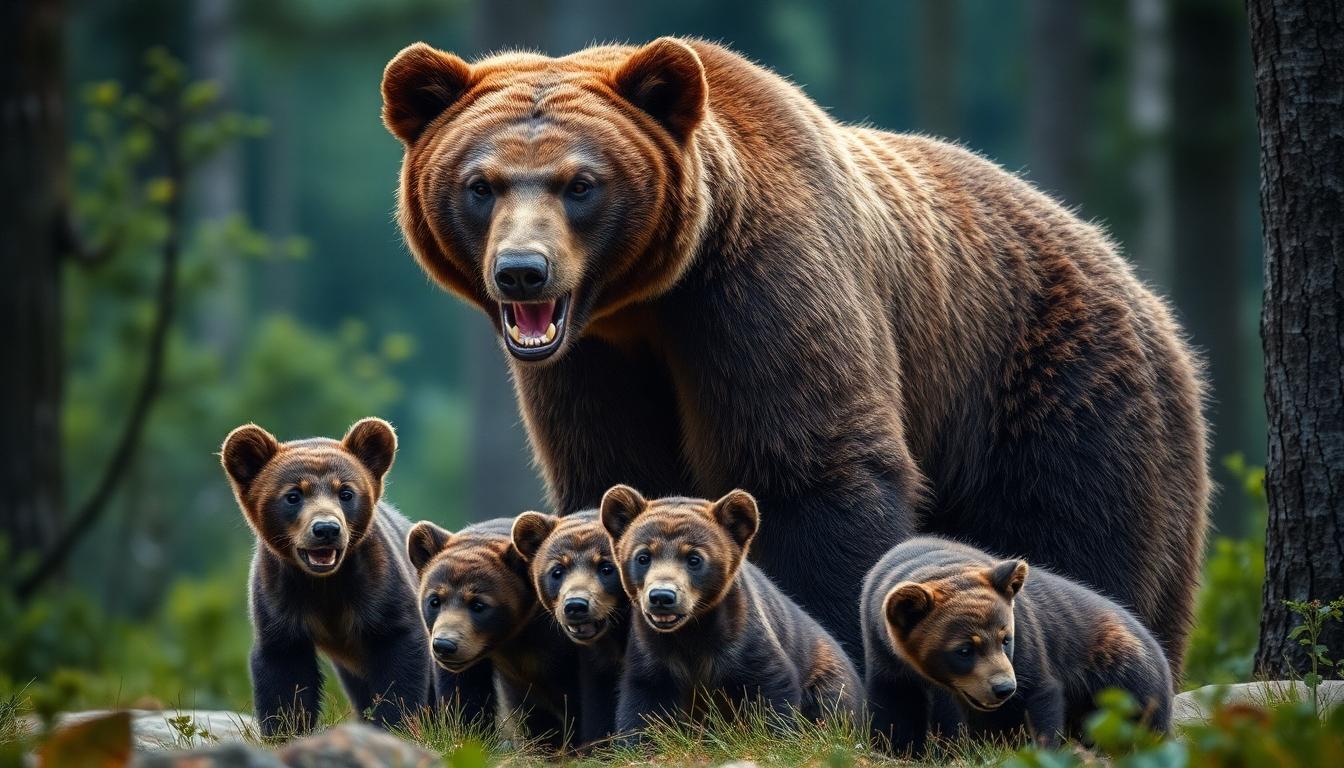The Bible contains many animal symbols that offer profound spiritual wisdom, and the bear stands among the most fascinating yet often overlooked creatures in scripture. Though mentioned sparingly, bears appear in important passages where they represent both divine judgment and surprising protection.
We’ll explore how bears in biblical context symbolize strength, maternal protection, and even God’s wrath when His people stray from righteousness. From the she-bears that emerged after Elisha’s curse to the prophetic visions where bears represent powerful kingdoms, these majestic creatures carry spiritual meanings that remain relevant today.
Join us as we uncover the deeper significance of bears in the Bible and what their appearances teach us about divine authority, spiritual watchfulness, and the complex nature of God’s interactions with humanity.
Bears in Biblical Context: A Symbolic Overview
Bears appear sporadically yet significantly throughout biblical texts, carrying powerful symbolic weight whenever they’re mentioned. Scripture portrays these creatures as embodiments of divine strength, judgment, and protective ferocity. The limited but impactful references to bears in biblical narratives often connect them to moments of spiritual instruction or divine warning.
Throughout the Old Testament, bears serve as agents of God’s justice, demonstrating both His power and the consequences of disobedience. Their presence in biblical texts creates a multifaceted symbol that communicates authority, wilderness danger, and maternal protection. Biblical bears function primarily as teaching tools, showing readers how God’s judgment can be swift and imposing like a provoked bear.
Archaeological findings from ancient Near Eastern cultures surrounding Israel reveal bears were widely recognized as symbols of power and danger. These cultural understandings inform how we interpret bear symbolism in biblical passages. Ancient Hebrew audiences would have immediately grasped the gravity of a bear reference, understanding the complex layers of meaning behind these imposing creatures in scriptural contexts.
The Strength and Power of Bears in Scripture
Bears embody formidable strength and divine authority throughout the Bible. They stand as powerful symbols representing God’s mighty judgment and His sovereignty over creation, functioning as metaphors for both His awesome power and protective nature.
Bears as a Symbol of Divine Judgment
Bears represent God’s divine judgment and righteous wrath in several biblical passages. In Hosea 13:8, God compares Himself to “a bear robbed of her cubs,” illustrating the fierce intensity of His justice when His covenant with His people is violated. This imagery conveys the unyielding nature of God’s commitment to upholding righteousness. The bear’s reputation for ferocity and power makes it an apt symbol for communicating the serious consequences of disobeying divine commands. God’s justice, like a protective mother bear, can be swift and absolute when provoked.
Bears in Biblical Narratives
Biblical narratives feature bears in contexts that highlight both divine protection and judgment. David’s testimony in 1 Samuel 17:34-37 recounts his experiences protecting sheep from lions and bears, demonstrating God’s provision and protection for those who place their trust in Him. This narrative established David’s credentials as a divinely appointed protector before his confrontation with Goliath.
Elisha’s encounter with the bears in 2 Kings 2:23-24 serves as a stark cautionary tale about the dangers of mocking God’s appointed messengers. After young men ridiculed Elisha, two bears emerged from the woods and mauled forty-two of them, illustrating the severe consequences of disrespecting divine authority.
Prophetic literature employs bear imagery to represent powerful kingdoms under God’s sovereign control. Daniel 7:5 depicts a bear representing the Medo-Persian Empire, showing how these mighty creatures symbolize earthly dominion in God’s prophetic timeline. The bear’s positioning in these visions emphasizes God’s ultimate authority over even the most powerful earthly kingdoms.
Maternal Protection: The Mother Bear Imagery
Perhaps one of the most powerful biblical metaphors is the image of a mother bear fiercely protecting her young, which serves as a profound illustration of God’s protective relationship with His people. This maternal imagery appears in several key passages, creating a striking contrast to the bear’s other symbolic roles of judgment and strength.
Female Bears Defending Their Cubs
Mother bears in Scripture exemplify extraordinary protective instincts toward their offspring. In Hosea 13:8, we find the vivid declaration, “Like a bear robbed of her cubs, I will attack them and rip them open,” illustrating the intensity of maternal defense that’s unparalleled in nature. Female bears demonstrate aggressive, unwavering commitment to their young when threatened, creating a powerful metaphor for divine protection. This natural behavior emphasizes the lengths to which a mother bear goes to defend her vulnerable cubs from danger, reflecting a protective ferocity that Scripture uses to communicate God’s passionate defense of His people.
God’s Protective Nature Compared to a Bear
The biblical text draws compelling parallels between maternal bear behavior and divine guardianship. God’s protective wrath against threats mirrors a bear’s instinct to safeguard its cubs, illustrating His covenantal loyalty to Israel. This comparison highlights not just defense but active intervention—God stands ready to confront those who threaten His chosen ones with the same determination as a mother bear defending her young. The imagery shifts our perspective from seeing bears solely as instruments of judgment to understanding them as symbols of God’s deliverance and protection. David’s account of defending against a bear in 1 Samuel 17:34-37 further reinforces this theme, framing such encounters as demonstrations of God-given strength provided to the faithful in times of danger.
Prophetic Appearances of Bears in the Bible
Bears appear in biblical prophecy as powerful symbols representing divine judgment and earthly kingdoms under God’s sovereignty. These prophetic references reveal how bear imagery conveys both God’s authority and His ultimate control over industry powers.
Daniel’s Vision of the Bear
Daniel’s vision in Daniel 7:5 features a bear-like creature representing the Medo-Persian Empire. This prophetic bear “raised itself up on one side, and had three ribs in its mouth between its teeth,” symbolizing a mighty kingdom that conquered three major territories. The bear’s asymmetrical stance in the vision reflects the uneven power distribution between the Medes and Persians, with the Persians eventually becoming the dominant force. God showed Daniel these animal symbols to illustrate His complete dominion over powerful earthly kingdoms, demonstrating that even the mightiest empires exist under divine authority.
The Bear and the Lion in Prophecy
Prophetic literature often pairs bears with lions to illustrate different aspects of divine judgment and power. Amos 5:19 presents a stark warning using this pairing: “It will be as though a man fled from a lion only to meet a bear,” depicting the inescapable nature of God’s judgment for those who stray from His path. This powerful imagery emphasizes the futility of attempting to escape divine justice when one has violated God’s covenant. In Hosea 13:8, God compares His protective wrath to “a bear robbed of her cubs,” highlighting the fierce intensity with which He defends His relationship with His people. Lions typically represent royal authority in biblical symbolism, while bears emphasize overwhelming strength and protective ferocity, together creating a complete picture of divine power that encompasses both majestic authority and unstoppable force.
Spiritual Lessons from Bear Symbolism
Biblical bear symbolism offers profound spiritual lessons that remain relevant for believers today. These powerful creatures serve as meaningful metaphors throughout Scripture, teaching us essential truths about God’s character and our spiritual journey.
Discerning Warning Signs
Bear encounters in Scripture function as divine caution signals, alerting us to potential spiritual danger. Amos 5:19 employs bear imagery to illustrate the inescapable nature of God’s judgment: “It will be as though a man fled from a lion only to meet a bear.” This vivid comparison emphasizes how futile it is to evade divine accountability, especially when living in disobedience. Bears appear at critical junctures in biblical narratives, serving as clear indicators that God’s patience has limits and that disrespect toward holy things carries serious consequences. The youths who mocked Elisha faced swift retribution from two bears, demonstrating how dismissing God’s authority leads to perilous outcomes.
Finding Balance Between Strength and Gentleness
Bears exemplify the perfect balance between formidable power and nurturing protection that reflects God’s complex nature. Hosea 13:8 portrays God as “a bear robbed of her cubs,” highlighting the fierce maternal instinct that mirrors divine commitment to His people. This duality teaches us that true spiritual strength isn’t merely about displaying power but also expressing protective love toward those under our care. Bears’ reputation for both ferocity and maternal dedication offers a template for spiritual maturity—showing formidable resolve against evil while maintaining gentle care for the vulnerable. Scripture uses this balance to reveal how God executes judgment not from cruelty but from passionate devotion to His covenant relationship, combining righteous authority with protective tenderness.
Contemporary Applications of Biblical Bear Symbolism
The bear’s duality in Scripture manifests as both a force of judgment and fierce protection, creating powerful applications for modern faith contexts. These Biblical bear symbols continue to resonate with believers today, offering rich metaphors for spiritual growth and understanding.
Bear Qualities in Christian Character
Biblical bear imagery directly informs several essential Christian character traits that strengthen believers’ spiritual walks. The bear’s legendary strength, exemplified in passages like 1 Samuel 17:34-37, encourages resilience when facing life’s adversities. Christians draw inspiration from this powerful creature when cultivating courage to confront sin and developing fervent devotion to their spiritual “cubs” – whether family members or community relationships. A mother bear’s protective instinct, vividly portrayed in Hosea 13:8, models the believer’s calling to defend both faith principles and vulnerable individuals within their sphere of influence. The aggressive nature of bears, as seen in 2 Kings 2:23-24, simultaneously serves as a warning against unchecked anger, reminding Christians to exercise discernment when wielding authority or influence in various situations.
Handling Spiritual Wilderness Encounters
Bears represent unexpected trials that test and refine our faith throughout life’s journey. In Proverbs 28:15, bears symbolize challenging circumstances that can unexpectedly confront believers, demanding spiritual preparedness and divine reliance. David’s victory over a bear before facing Goliath (1 Samuel 17:37) illustrates how completely relying on God’s strength during crises builds faith for future challenges. These powerful narratives encourage Christians to reframe hardships as growth opportunities rather than mere obstacles. Wilderness seasons – periods of doubt, isolation, or persecution – take on new meaning when viewed through the bear symbolism lens found in Scripture. God’s sovereignty over worldly power structures, depicted through bear imagery in Daniel 7:5, reassures believers that even the most intimidating earthly authorities remain under divine control. This prophetic framework emboldens Christians to trust God’s ultimate authority over seemingly overwhelming circumstances they encounter in their spiritual journeys.
Conclusion
The bear’s spiritual significance in Scripture reveals profound truths about God’s character and His relationship with humanity. Through these powerful creatures we witness divine judgment executed with purpose while simultaneously experiencing God’s fierce protective love.
Bears remind us that spiritual strength comes in many forms – sometimes as judgment against wickedness sometimes as defense for the vulnerable. Their presence in biblical narratives teaches us to respect divine authority while trusting in God’s protective care.
As we reflect on bear symbolism we’re invited to embrace both spiritual resilience and godly discernment. These majestic creatures eventually point us toward a deeper understanding of our Creator who judges righteously yet shields His children with the tenacity of a mother bear defending her young.
Frequently Asked Questions
What do bears symbolize in the Bible?
Bears in the Bible primarily symbolize three key concepts: divine judgment, exceptional strength, and maternal protection. Though mentioned infrequently, they appear at significant moments to demonstrate God’s power and the consequences of disobedience. Bears serve as teaching tools that illustrate how God’s judgment can be swift and imposing while also reflecting His protective nature.
Where is the most famous bear story in the Bible?
The most famous biblical bear account is found in 2 Kings 2:23-24, where two female bears emerge from the woods and maul 42 youths who were mocking the prophet Elisha. This powerful narrative demonstrates divine judgment and the serious consequences of disrespecting God’s appointed prophet, serving as a sobering reminder of God’s authority.
How are bears used in biblical prophecy?
In prophetic literature, bears represent powerful kingdoms under God’s sovereignty. Most notably, in Daniel 7:5, a bear-like creature symbolizes the Medo-Persian Empire, illustrating God’s dominion over earthly powers. Bears are often paired with lions in prophecies to emphasize the inescapable nature of divine judgment and the contrasting aspects of God’s authority.
Did David really fight a bear?
Yes, David recounts fighting and killing both a lion and a bear while protecting his father’s sheep (1 Samuel 17:34-37). This encounter served as proof of David’s courage before facing Goliath and demonstrated God’s provision of strength to the faithful in times of danger. The story emphasizes how God prepares His chosen servants through various challenges.
What does a mother bear represent in Scripture?
A mother bear in Scripture represents fierce protective love, especially in Hosea 13:8 where God compares Himself to “a bear robbed of her cubs.” This powerful maternal imagery illustrates God’s passionate commitment to defending His people. The she-bears that responded to Elisha’s curse further emphasize this protective aspect of divine authority.
How does bear symbolism apply to modern faith?
Bear symbolism reminds modern believers to develop spiritual resilience, confront sin courageously, and protect their spiritual “cubs” with fierce devotion. Bears also represent unexpected trials that test faith, encouraging Christians to rely on God’s strength during challenges. Their dual nature of strength and protective gentleness reflects how believers should balance power with love in their spiritual lives.
Why does God compare Himself to a bear in Hosea?
In Hosea 13:8, God compares Himself to a mother bear robbed of her cubs to illustrate the intensity of His protective love and righteous judgment. This vivid imagery communicates that God’s judgment stems from passionate devotion rather than cruelty. It reveals how deeply God cares for His covenant people while warning of the consequences of betraying that covenant relationship.
What spiritual lessons can we learn from biblical bear encounters?
Biblical bear encounters teach vigilance against spiritual dangers, as illustrated in Amos 5:19. They demonstrate how God provides strength during trials and reveal the balance between power and gentleness that reflects God’s complex nature. These stories show that hardships often serve as preparation for greater challenges and remind us of God’s sovereignty over all earthly powers.
























